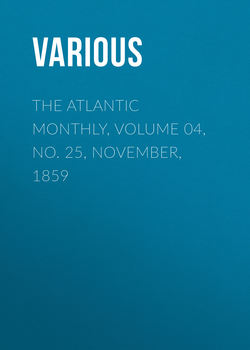The Atlantic Monthly, Volume 04, No. 25, November, 1859

Реклама. ООО «ЛитРес», ИНН: 7719571260.
Оглавление
Various. The Atlantic Monthly, Volume 04, No. 25, November, 1859
E. FELICE FORESTI
LARVAE
THE MINISTER'S WOOING.4
CHAPTER XXX
CHAPTER XXXI
CHAPTER XXXII
CHAPTER XXXIII
CHAPTER XXXIV
TOM PAINE'S FIRST APPEARANCE IN AMERICA
TRIAL TRIP OF THE "FLYING CLOUD."
THE RECKONING
THE PASEO—THE PLAZA—DINING OUT
GAME-CHICKENS—DON RODRIGUEZ—DAY ON THE PLANTATION—DE-PARTURE
THE FIRST AND THE LAST
THE PROFESSOR AT THE BREAKFAST-TABLE
HYMN OF TRUST
REVIEWS AND LITERARY NOTICES
RECENT AMERICAN PUBLICATIONS
Отрывок из книги
Late in the autumn of 1836, an Austrian brig-of-war cast anchor in the harbor of New York; and seldom have voyagers disembarked with such exhilarating emotions as thrilled the hearts of some of the passengers who then and there exchanged ship for shore. Yet their delight was not the joy of reunion with home and friends, nor the cheerful expectancy of the adventurous upon reaching a long-sought land of promise, nor the fresh sensation of the inexperienced when first beholding a new country; it was the relief of enfranchised men, the rapture of devotees of freedom, loosened from a thrall, escaped from surveillance, and breathing, after years of captivity, the air where liberty is law, and self-government the basis of civic life. These were exiles; but the bitterness of that lot was forgotten, at the moment, in the proud consciousness of having incurred it through allegiance to freedom, and being destined to endure it in a consecrated asylum. In that air, when first respired, on that soil, when first trod, they were unconscious of the lot of strangers: for there the vigilant eye of despotism ceased to watch their steps; prudence checked no more the expression of honest thought or high aspiration; manhood resumed its erect port, mind its spontaneous vigor; nor did many moments pass ere friendly hands were extended, and kindly voices heard, and domestic retreats thrown open. Their welfare had been commended to generous hearts; and the simple facts of their previous history won them respectful sympathy and cordial greeting.
Prominent amid the excited group was a tall, well-knit figure, whose high, square brow, benign smile, and frank earnestness bespoke a man of moral energy, vigorous intellect, and warm, candid, tender soul. Traces of suffering, of thought, of stern purpose were, indeed, apparent; but with and above them, the ingenuousness and the glow of a brave and ardent man. This was ELEUTARIO FELICE FORESTI,—subsequently, and for years, the favorite professor of his beautiful native language and literature in New York,—the favorite guest and the cherished friend in her most cultivated homes and among her best citizens,—the Italian patriot, which title he vindicated by consistency, self-respect, and the most genial qualities. The vocation he adopted, because of its availability, only served to make apparent comprehensive endowments and an independent spirit; the lady with whom he read Tasso, beside the chivalrous music of the "Jerusalem Delivered," learned to appreciate modern knighthood; and the scholar to whom he expounded Dante, from the political chart of the Middle Ages, turned to an incarnation of existent patriotism. Not only by the arguments of Gioberti, the graphic pictures of Manzoni, and the terse pathos of Leopardi, did he illustrate what Italy boasts of later genius; but through his own eloquent integrity and magnetic love of her achievements and faith in her destiny. The savings of years of patient toil were sacrificed to the subsistence of his poor countrymen who came hither after bravely fighting at Rome, Venice, Milan, and Novara, to have their fruits of victory treacherously gathered by aliens. Infirmity, consequent upon early privation and the unhealed wounds of long-worn chains, laid the stalwart frame of the brave and generous exile on a bed of pain. He uttered no complaint, and whispered not of the fear which no courage can quell in high natures, that of losing "the glorious privilege of being independent": yet his American friends must have surmised the truth; for, one day, he received a letter stating that a sum, fully adequate for two years' support, remained to his credit on the books of a merchant,—one of those mysterious provisions, such as once redeemed a note of Henry Clay's, and of which no explanation can be given, except that "it is a way they have" among the merchant princes of New York. By a providential coincidence, surgical skill, at this juncture, essentially improved his physical condition; but it became indispensable, at the same time, that he should exchange our rigorous clime for one more congenial; and he sailed five years ago for Italy, taking up his residence in Piedmont, where dwell so many of the eminent adherents of the cause he loved, and where the institutions, polity, and social life include so many elements of progress and of faith. It was now that those who knew him best, including some of the leading citizens of his adopted city, applied to the Executive for his appointment as United States Consul at Genoa. There was a singular propriety in the request. Having passed and honored the ordeal of American citizenship, and being then a popular resident of the city which gave birth to the discoverer of this continent,—familiar with our institutions, and endeared to so many of the wise and brave in America and Italy,—illustrious through suffering, a veteran disciple and martyr of freedom,—he was eminently a representative man, whom freemen should delight to honor; and while it then gratified our sense of the appropriate that this distinction and resource should cheer his declining years, we are impelled, now that death has canonized misfortune and integrity, to avail ourselves of the occasion to rehearse the incidents and revive the lessons of his life.1
.....
"Oh, Virginie! Virginie!" exclaimed Mary, kneeling and stretching her arms over the rock; but another voice called Virginie, in a tone which went to her heart. She turned and saw those dark eyes full of tears.
"Oh, come!" he said, with that voice which she never could resist.
.....